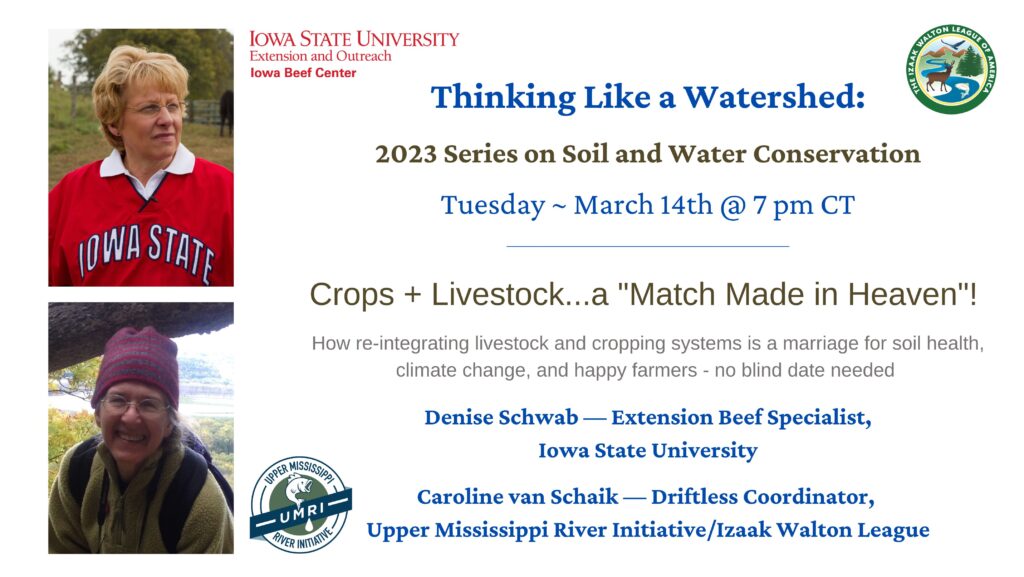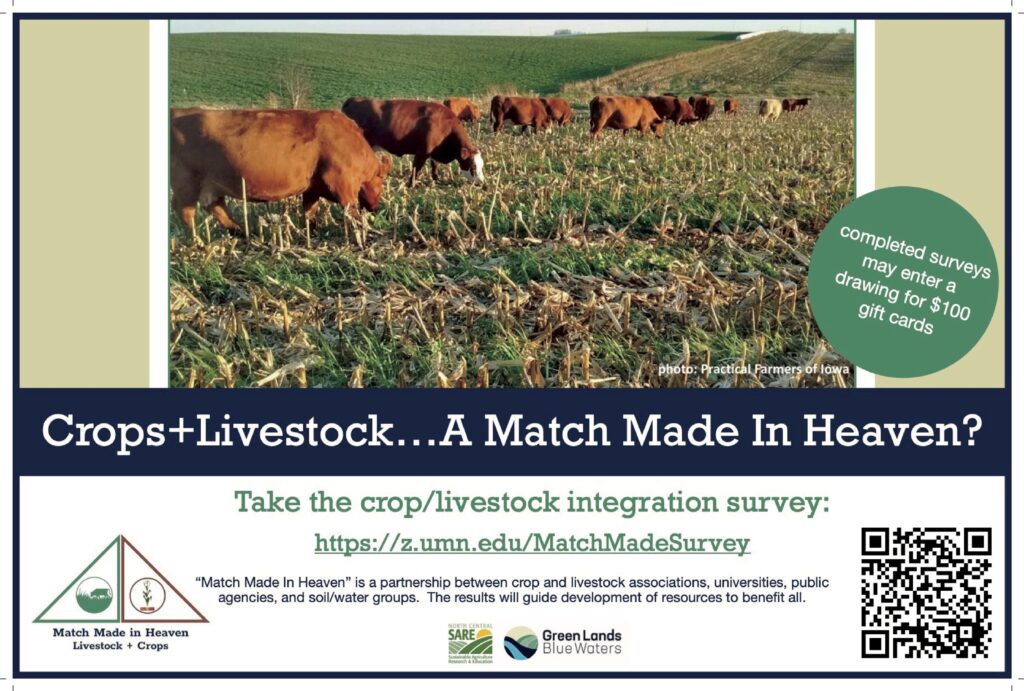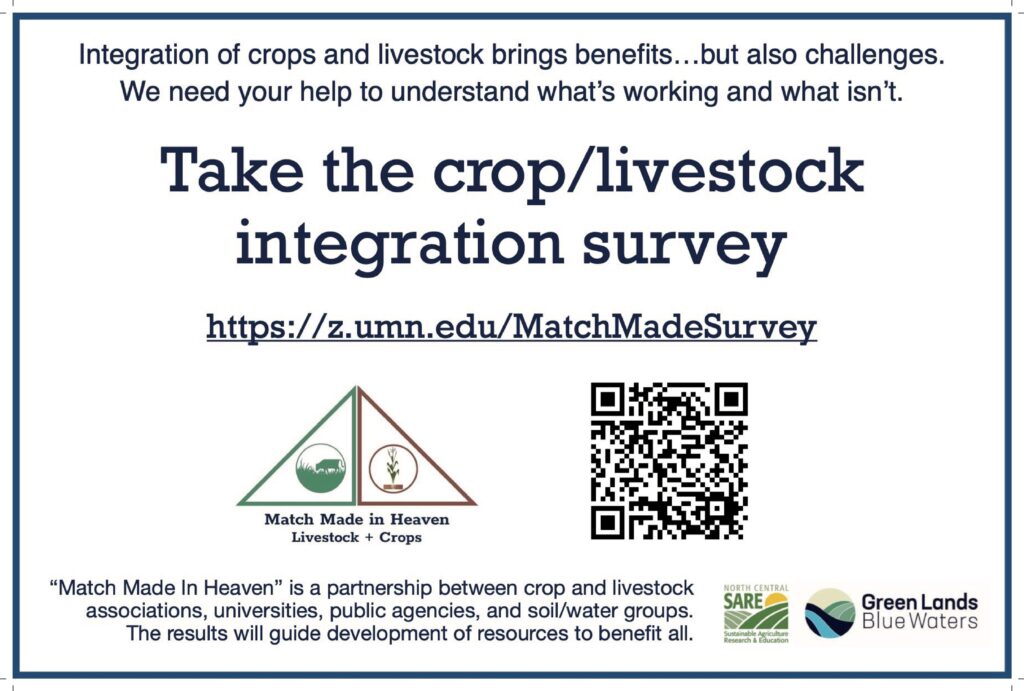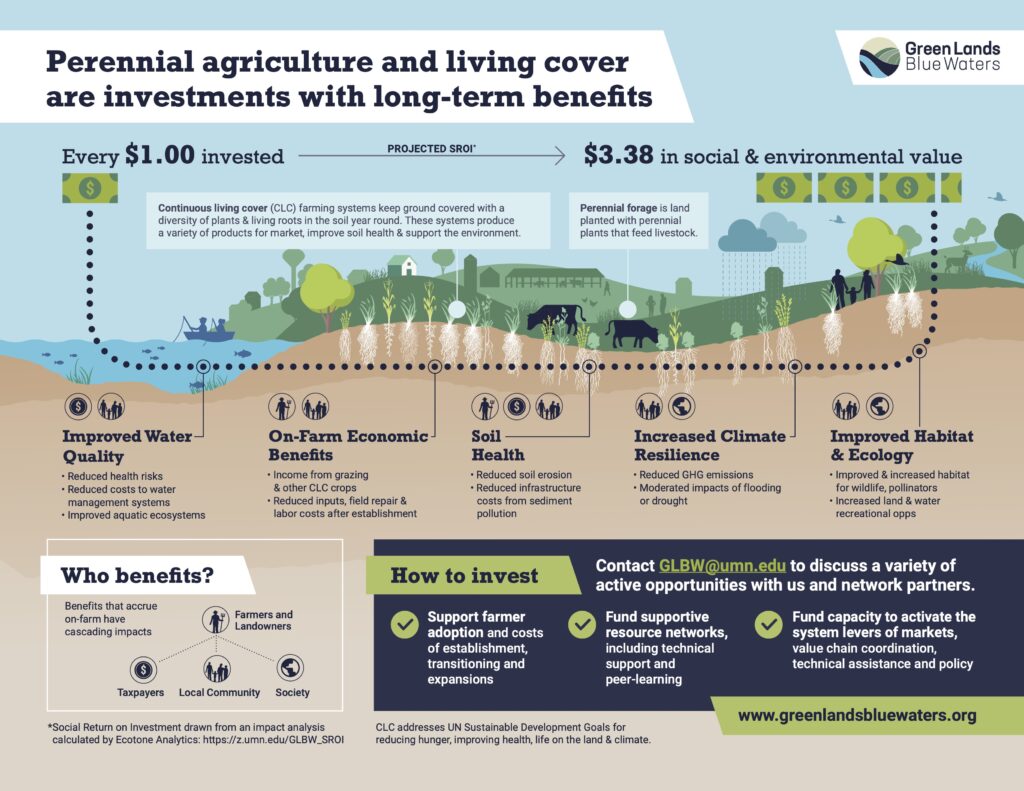But first!
Top of page for deadlines, with details below. Read on for how to act on your priorities:
➢ Mar. 14 at 7 p.m. – “How re-integrating livestock and cropping systems is a marriage for soil health, climate change, and happy farmers – no blind date needed.” See below for details and to register for this month’s “Thinking Like a Watershed” series.
➢ We need 10,000 farmers and landowners to tell us stuff about crops and livestock. See below for survey details and how to take it yourself.
➢ Save Our Streams (SOS) streamside training late May – see below for how to save your spot.
➢ Ap. 26 at 7 p.m. – UMRI presentation, Wabasha, MN. Contact presidentwapashaw@gmail.com for details.

“Thinking” about that crop and livestock “marriage” Mar. 14 at 7 p.m.
Our Mar. 14, 2023 “Thinking Like a Watershed” program takes on the subject of crop farmers and livestock producers who could go farther down the road of soil health if they did so together. That’s the quest behind a 6-state effort called “Match Made in Heaven” that currently is focused on getting 10,000 responses to a brand new survey. Iowa State Extension Beef Specialist Denise Schwab and UMRI’s Caroline van Schaik will discuss the survey, yes, a little, but also, the breathtaking bedfellows that created it and why this is not just another questionnaire.
Crops + Livestock…a “Match Made in Heaven”
—Denise Schwab, Extension Beef Specialist, Iowa State University
—Caroline van Schaik, Driftless coordinator, Upper Mississippi River Initiative/Izaak Walton League
After registering, you will receive a confirmation email containing information about joining the meeting.
Please share this event with your networks! Facebook link!
Forthright talk about cropland, livestock, and the matchmaking that would put soil and farmers alike in a healthier state have culminated in a just-released survey to understand why this marriage is so hard to sell. We know some about the benefits – to public waters, habitat, rural economy, roads, wildlife, and a pool of resilience against weather, climate, and global everything. But what are the challenges?
Iowa Extension beef specialist Denise Schwab and UMRI’s Caroline van Schaik shed light on the 6-state “Match Made in Heaven”, its unusual bedfellows, the challenging conversations that shape the survey, and the 10,000 responses they hope the survey generates. Both are active members of the project’s advisory group and farm in northeast Iowa and southeast Minnesota, respectively.
Don’t forget to Register Here!
This monthly series is a project of the Upper Mississippi River Initiative (UMRI) of the Izaak Walton League of America, with co-hosts Christine Curry of UMRI, Chris Henning of the Panora Conservation Chapter, and Des Moines Chapter Communication Director, Bud Hartley. We feature guests for 30-40 minute presentations that shed daylight on good works done in the name of the Mississippi and its uplands. In this way we uplift our shared goals for a cleaner river, a cared for environment, and kinder communities. Recorded programs are available at UMRI’s resource page shortly after they air live.
“Thinking” February recording
The recording to February’s program is available now: “The Green Amendment Movement as a Path to Environmental Health”: Thinking Like a Watershed with Maya K. van Rossum – Feb. 14, 2023
How the Green Amendment movement is incorporating constitutional rights at the state level to codify a healthy environment, with Maya van Rossum, Founder, Green Amendment for the Generations.

We seek answers and thoughts from 10,000 farmers and non-operating landowners on their specific challenges to integrating crops and livestock. Please, if you are a farmer or landowner, use the QR code or the link to take this survey yourself and then pass it on. There are prizes!

10,000 farmers/landowners
We seek answers and thoughts from 10,000 farmers and non-operating landowners on their specific challenges to integrating crops and livestock. What do they see as the benefits? Is this “marriage” already ongoing on their farm? How does it work, why doesn’t it, and what else should we know?
Please take the survey via the QR code (mobile phone- and laptop-friendly)
Please get it to your constituents. Please contact Caroline van Schaik with questions etc.
UMRI is part of a multi-state effort to talk forthrightly about cropland, livestock, and the matchmaking that would put soil and farmers alike in a healthier state. That in turn helps public waters, habitat, rural economy, roads, and wildlife be more resilient against weather, climate, and global everything. If the integration of crops and livestock brings benefits, we also acknowledge the challenges. We’ve spent months and many difficult conversations assembling questions whose answers we hope provide direction to more useful technical help, workshops, research, financial options etc.
“Match Made in Heaven” is a partnership between crop and livestock associations, universities, public agencies, and soil/water groups. The results will guide development of resources to benefit farmers, landowners, and the public at large who bear the consequences of farming beyond the farm gate. For more details on the initiative, please see Green Lands Blue Waters/Midwest Perennial Forage Working Group

The above referenced survey to understand why crop and livestock producers don’t do more together stems from a larger body of work that advocated for more soil cover more months of each year. This illustration suggests there is money to be made and saved when we put our money where are mouths and hearts are; that is, on valuing soil, farmers, habitat, and the environment.
Streamside training in May
UMRI in the Driftless region of Minnesota will host a Save Our Streams (SOS) training workshop in May with certified trainer, Dr. Jenny Biederman. Please contact Caroline van Schaik to put your name on an “Interested” list so that details get to you directly. Space will be limited so that “stream side” really is, for everyone. The only prerequisite is enthusiasm! Really!
In the meantime, you can do some on-line winter homework by way of preparation at Save Our Streams. The SOS program, begun 51 years ago, is a national effort by the Izaak Walton League to engage volunteers across the country in collecting data according to standard protocols. Data are uploaded to a searchable hub and are used at the federal level to inform water policy and practice. In-person training had been suspended due to Covid; a grant from the IWLA Endowment Board allows us to reconsider this option.
